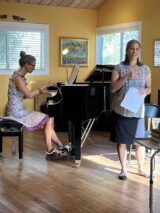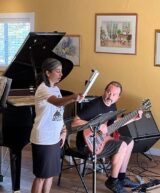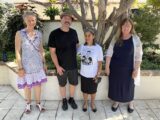Featured Stories
Finding the Balance Between Science and Music: An Interview with Dr. Hima Joshi
Author’s note: As both a classroom teacher and a private music instructor, I’m a firm believer in the importance of music education for adults as well as for kids. However, I’ve noticed a tendency in our culture to shame adults for doing anything that isn’t working, exercising, or caring for children. Why should adults bother with music when there are bills to be paid? And why prioritize music education in the schools when there’s barely enough funding for the “important” subjects like math and science?
If you’d like answers to those questions, I’d like to introduce you to Dr. Hima Joshi. She’s a trained opera singer with a PhD in organic chemistry, and she’s a professor at Grossmont College. Every year, Dr. Joshi puts on a concert as both a performance goal for herself and as a way to raise money for a cause that is important to her. Last month, on August 13, she gave her first concert since the pandemic to benefit Gavi, the global vaccine alliance. We sat down to discuss her recent performance and the ways that music plays an important role in her career as a chemistry professor.
Catherine Barnes: Which came first for you, music or science?

Hima Joshi sings music from The Barber of Seville, accompanied by Anna Juliar.
Hima Joshi: I think it was kind of at the same time, because that’s the household I grew up in. Both of my parents are in math and science. My mom was a doctor, and my dad worked as a database analyst in computer science. It was kind of an expectation that we kids would go into science or math, but I also had a very musical and artistic household. Both of my parents have hobbies in the arts: my mom writes poetry in Marathi, which is my family language—it’s one of the Indian languages—and my dad plays an instrument called the harmonium, which is a keyboard instrument that looks like a box that sits on the floor; one pumps air into it like one would pump an accordion. So, I don’t know what came first; I think it was just always in my life.
CB: I remember you told me that you were originally thinking of doing pre-med in college, but then something changed your mind. Can you tell us that story?
HJ: The expectation was that I go into medicine and, so of course, I was taking biology and organic chemistry and all those classes. I really fell in love with organic chemistry; I was just wowed by it. It kicked my butt initially. A lot of people assume that because I chose to study organic chemistry and pursue an advanced degree that it came easily for me, but actually it was just the opposite, and I think that’s what attracted me to it. I like a challenge, and I just didn’t think that I had to be naturally good at something. I felt like if I worked hard enough, I could get good at it, and I enjoyed studying it.
CB: Do you ever experience singing as a challenge?
HJ: Oh yeah, because I’m not the best sight reader, and a lot of us singers—especially sopranos— are guilty of that. Rhythmically I’m pretty good, but in terms of notes and intervals, I’m not as good as some people are, so what I lack in sight reading ability I make up for in effort. Sight reading for singing is different from playing an instrument: you have to know what the pitch sounds like in your mind before you sing it.
Also, singing is not my profession, so I don’t put the same kind of time into it that a professional would, which means it takes me a lot longer to learn a piece. A professional might learn a particular piece in a matter of weeks, but it might take me months or a year, which is fine, because I like doing that. I like to study; I never feel like, “Oh, when am I going to learn this already?” unless
I’ve planned poorly, and I know I have a performance coming up, but usually I take into account that it’s going to take me a while.
CB: How have you balanced your singing with all the demands on you as an organic chemist and as a professor?
HJ: There have been times when it has been hard. In undergrad, when I was living in the dorms and it was cold and flu season, there were times when I had to cancel my lesson because I just wasn’t feeling well enough. And, of course, I had to focus on my major, and no classes in my major came easily to me! So that was a time when I was keeping the music going, but it wasn’t the balance that I wanted.
But chemistry graduate school is about being in the lab. Essentially, the first year you have long hours in the lab, and so it feels more like a job than it does school. I had time to go to choir on Monday evenings. I was in the La Jolla Symphony Chorus—and I still am—so as long as I was accomplishing what I needed to in the laboratory, no one was asking me what I was doing in the evenings or on weekends.
I’ve often had to strike that balance out of necessity, because music is what has kept me sane so often. It’s not like, “Oh, my gosh, how am I going to find time to do this music?” It’s rather, “Oh my gosh, I need to do some music, or I’m going to go bonkers!” It’s very much like exercise for me; I use music and exercise in a way that helps me mitigate anxiety.
CB: How has your musical training influenced your career as a chemist and a professor?
HJ: I help my students understand that learning chemistry requires the same kind of practice that learning an instrument or learning to play a sport does. I use that analogy all the time, because some students feel like, “Oh, I have to already be good at chemistry to learn chemistry,” and so they come into classes saying, “Well, I’m not good at chemistry.”
I’m like, “Well, you’re not good at chemistry YET.” Can you pick up the violin and play it? Can you just go out there and play football if no one’s ever taught you, and you haven’t practiced? No? So why would chemistry be any different? I know what it takes for me to keep my instrument healthy and to learn a piece of music, and learning chemistry or anything else is not that different, right? It’s about repetition. It’s about reflection. It’s about feedback from external sources and incorporating that feedback. It’s really the same thing.
CB: At your concert, you did some songs with your husband, bassist Jeremy Copp, and you mentioned that he doesn’t read music. What happened when your worlds collided

Dr. Joshi uses a handchime while rehearsing with her husband, bassist Jeremy Copp, before the performance.
HJ: He can read—you can sit him down with the score, and he’ll be able to say, “Okay, that’s in 4-4, and this is a quarter, and these are eighth notes,” but he doesn’t learn that way, because he’s a rock musician. So, he learns mainly by ear; he counts really well, especially in odd meters. But if there’s a piece of music that we’re working on, we have to figure out a way to communicate. There were moments when we were totally off kilter because I made an assumption that he saw in the music what I saw in the music. For example, the piece was in 3-2, and I asked, “Why are you doing that?” He says, “I’m counting to four. I’m like, “Ah, we didn’t discuss this!”
But I think that it was helpful to me, because the fun of arranging something for soprano and bass guitar is to come off the page a little bit with our own flair. That’s the fun of not being married to the music on the page and just being married to—well, literally married!—but married to the concept that we’re going to do something different; we’re going to feel it out together.
CB: How did you choose your repertoire for this show?
HJ: Some of it was, again, necessity. The start of the show was about solitude, so I sang the first two pieces by myself. Singers typically don’t just sing by themselves; they have a piano accompaniment. I wasn’t able to meet with my pianist, and I had to come up with something to do, so I had been working on these folk songs. I thought, “Okay, well, let me just sing them a cappella,” and so that’s what motivated the first part of the concert.
Then I asked my friend who plays handbells, “Can you think of something that I can play that feels like accompaniment, so it’s not just my naked voice?” and so she told me about the hand chime. It’s interesting, because I was doing Skype lessons with my voice teacher, and she said that my voice improved because I was trying to imitate the resonant sound of the chime.
CB: And I wonder if it also helped you with intervals and sight-singing?

Concert personnel: Anna Juliar (piano), Jeremy Copp (bass), Hima Joshi (soprano), Kathryn Kinslow (soprano).
HJ: A little bit, because I had to say to myself, “Okay, this hand chime is a 440, so what note am I starting on? I’m going to find that note!” I didn’t start any of those initial pieces on “A.” I started on pitches that related to “A,” so I started on the minor third, or something like that.
The next piece that I sang was by Juliana Hall, which was the e. e. cummings poem [“O sweet spontaneous”] for unaccompanied soprano. I had to give myself an opening pitch, which was an “A,” and then find my way through the piece just referencing the pitches that were in my head. So, that was really hard to learn, because nobody was playing anything. I couldn’t look at a piano part and say, “Oh yeah, she’s playing that pitch there, and then I’m going to be able to get my pitch here.” It wasn’t as simple as “Twinkle, Twinkle, Little Star,” because it was not a conventional sounding melody. So, a lot of that was reading intervals and trying to memorize them and then kind of backing off and seeing if I could sing those intervals and just make them feel normal. There was a lot of going to the piano, plunking it out, and then singing it for myself, and then checking until the pitches just kind of came.
CB: Well, and you’ve just outlined that process you talked about earlier, where here was this thing that was hard, and you rose to the challenge.
HJ: Yeah, I did it, and I was surprised that I was able to do it. I was really glad I found the piece, which I did for this concert and also for the La Jolla Symphony Chorus’ virtual potluck. It was a virtual concert, meaning a whole bunch of stuff was recorded ahead of time. They asked anyone in the La Jolla Symphony or in the chorus to submit an idea for something they wanted to play or sing, and so I submitted that piece because I had been working on it.
And they said, “Okay, yeah, let’s do it,” and I got to go to a church and record it with a sound engineer. It was fun! It was right after we had all gotten vaccinated, before the variants started coming, so we felt comfortable going into the church and recording. At the end of all of that, the music director, Steve Schick, said, “Hey, you should send the recording to the composer,” and I said, “I’m not gonna do that! That’s kind of scary! I shouldn’t do it. Should I really do it? Okay…I’ll do It!” So, I went to Juliana Hall’s website, and I found her contact information. I said, “Hi, my name’s Hima, and I sing your song. If you would like to hear it, here’s the YouTube link.”
She wrote back to me the next day, and she said, “Thank you for making it your own and for learning it so thoroughly.” I guess I didn’t have as many wrong notes as maybe some people have had in the past, but that was exciting!
CB: If Steve Schick tells you, “Hey, you should send your recording to the composer,” that’s a pretty big deal—especially because you’re a chemist!
HJ: It helps to be a chemist, though, because there’s no pressure on me. The bar is lower for me as a singer because I’m a chemist. At any point, I can be like, “Oh well, I messed up that note! I sang that note wrong!” or, “I sang that piece poorly,” but whatever; I’m just a chemist and I’m not expected to sing well. That takes the pressure off, and that can actually be really helpful.
This interview has been edited for length and clarity. For a video and audio of the full interview, along with a video of Dr. Joshi’s August 13 concert, visit queenmabmusic.com/himajoshi/










